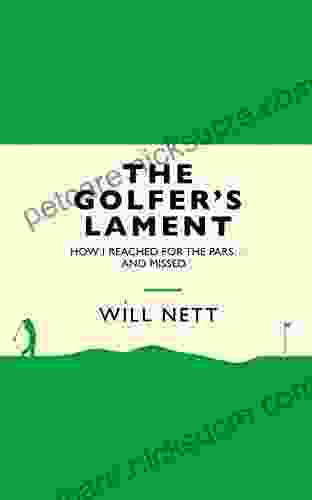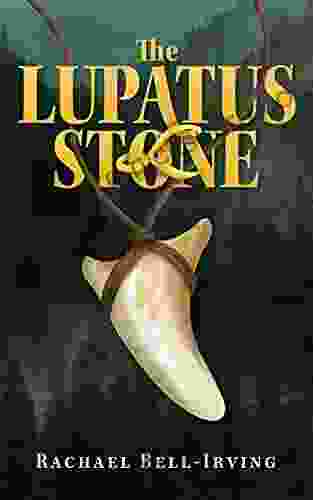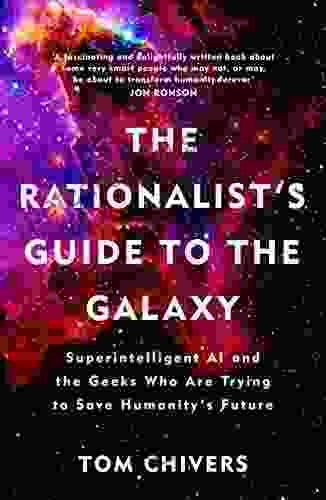The Rationalist's Guide to the Galaxy

The Rationalist's Guide to the Galaxy is a comprehensive guide to the universe for people who want to understand the world around them using reason and evidence. It is a resource for skeptics, atheists, agnostics, humanists, secularists, freethinkers, and anyone else who is interested in learning more about the world around them.
4.2 out of 5
| Language | : | English |
| File size | : | 1260 KB |
| Text-to-Speech | : | Enabled |
| Screen Reader | : | Supported |
| Enhanced typesetting | : | Enabled |
| Word Wise | : | Enabled |
| Print length | : | 242 pages |
The Rationalist's Guide to the Galaxy is written by a team of experts in the fields of science, philosophy, and critical thinking. The guide covers a wide range of topics, including:
- The history of rationalism
- The principles of rationalism
- The methods of rationalism
- The applications of rationalism
The Rationalist's Guide to the Galaxy is a valuable resource for anyone who wants to understand the world around them using reason and evidence. It is a must-read for anyone who is interested in skepticism, atheism, agnosticism, humanism, secularism, freethought, critical thinking, logic, and evidence.
The History of Rationalism
Rationalism is a philosophical tradition that emphasizes the use of reason and evidence to understand the world. It is based on the idea that the human mind is capable of understanding the world through observation, reason, and logic.
The history of rationalism can be traced back to the ancient Greek philosophers, such as Socrates, Plato, and Aristotle. These philosophers believed that the world could be understood through the use of reason and logic.
In the Middle Ages, rationalism was largely eclipsed by the rise of Christianity. However, it began to re-emerge in the Renaissance, with the work of philosophers such as René Descartes and Francis Bacon.
In the Enlightenment, rationalism became the dominant philosophical tradition. Philosophers such as Voltaire, Rousseau, and Kant believed that the world could be understood through the use of reason and evidence.
In the 19th century, rationalism was challenged by the rise of empiricism. Empiricists believe that all knowledge is derived from experience. However, rationalism remains a major philosophical tradition today.
The Principles of Rationalism
The principles of rationalism are based on the idea that the human mind is capable of understanding the world through observation, reason, and logic.
The most important principles of rationalism are:
- The principle of non-contradiction: This principle states that it is impossible for a proposition to be both true and false at the same time.
- The principle of identity: This principle states that a thing is identical to itself.
- The principle of the excluded middle: This principle states that for any proposition, either it is true or it is false.
- The principle of sufficient reason: This principle states that for any event, there must be a sufficient reason for it to occur.
These principles are the foundation of rationalism. They allow us to make inferences about the world around us and to draw s about what is true and what is false.
The Methods of Rationalism
The methods of rationalism are based on the principles of rationalism. They allow us to use reason and evidence to understand the world around us.
The most important methods of rationalism are:
- Observation: Observation is the process of gathering information about the world around us. It can be done through our senses, through instruments, or through other means.
- Reason: Reason is the process of using our minds to make inferences about the world around us. It can be used to draw s from evidence, to solve problems, and to make decisions.
- Logic: Logic is the study of the principles of correct reasoning. It can be used to ensure that our arguments are valid and to avoid logical fallacies.
These methods are the tools that we use to understand the world around us. They allow us to make inferences about the world, to draw s about what is true and what is false, and to make decisions about how to live our lives.
The Applications of Rationalism
Rationalism can be applied to a wide range of fields, including science, philosophy, and everyday life.
In science, rationalism is used to develop theories and to test hypotheses. It is also used to interpret data and to make predictions about the world around us.
In philosophy, rationalism is used to develop ethical theories and to argue about the nature of reality. It is also used to analyze arguments and to identify logical fallacies.
In everyday life, rationalism can be used to make decisions about what to believe, what to do, and how to live our lives. It can also be used to evaluate the claims of others and to avoid being misled by propaganda and misinformation.
Rationalism is a powerful tool that can be used to understand the world around us and to make better decisions. It is a valuable resource for anyone who wants to live a more informed and rational life.
The Rationalist's Guide to the Galaxy is a comprehensive guide to the universe for people who want to understand the world around them using reason and evidence. It is a resource for skeptics, atheists, agnostics, humanists, secularists, freethinkers, and anyone else who is interested in learning more about the world around them.
The Rationalist's Guide to the Galaxy is written by a team of experts in the fields of science, philosophy, and critical thinking. The guide covers a wide range of topics, including the history of rationalism, the principles of rationalism, the methods of rationalism, and the applications of rationalism.
The Rationalist's Guide to the Galaxy is a valuable resource for anyone who wants to understand the world around them using reason and evidence. It is a must-read for anyone
4.2 out of 5
| Language | : | English |
| File size | : | 1260 KB |
| Text-to-Speech | : | Enabled |
| Screen Reader | : | Supported |
| Enhanced typesetting | : | Enabled |
| Word Wise | : | Enabled |
| Print length | : | 242 pages |
Do you want to contribute by writing guest posts on this blog?
Please contact us and send us a resume of previous articles that you have written.
 Fiction
Fiction Non Fiction
Non Fiction Romance
Romance Mystery
Mystery Thriller
Thriller SciFi
SciFi Fantasy
Fantasy Horror
Horror Biography
Biography Selfhelp
Selfhelp Business
Business History
History Classics
Classics Poetry
Poetry Childrens
Childrens Young Adult
Young Adult Educational
Educational Cooking
Cooking Travel
Travel Lifestyle
Lifestyle Spirituality
Spirituality Health
Health Fitness
Fitness Technology
Technology Science
Science Arts
Arts Crafts
Crafts DIY
DIY Gardening
Gardening Petcare
Petcare Wabun Wind
Wabun Wind Daniel L Schacter
Daniel L Schacter Joachim Rossberg
Joachim Rossberg Paul Haddad
Paul Haddad Forrest Willett
Forrest Willett Lori Bregman
Lori Bregman Janet Godwin
Janet Godwin Carol Matsuzaki
Carol Matsuzaki Laura Prepon
Laura Prepon Charlotte Eliopoulos
Charlotte Eliopoulos Lindsey Bliss
Lindsey Bliss Asti Hustvedt
Asti Hustvedt John Small
John Small 1st Edition Kindle Edition
1st Edition Kindle Edition Ben Rothenberg
Ben Rothenberg Manjit Kumar
Manjit Kumar Bob Chandler
Bob Chandler Brad Myers
Brad Myers Tim Hollister
Tim Hollister Helen Garabedian
Helen Garabedian Alice Roberts
Alice Roberts Aron Ralston
Aron Ralston Gail Buckland
Gail Buckland Natalia Molina
Natalia Molina Peter Heller
Peter Heller Ali Psiuk
Ali Psiuk Mara Rutherford
Mara Rutherford David Roberts
David Roberts Rachael Bell Irving
Rachael Bell Irving Vikas Bhushan
Vikas Bhushan Clifford E Trafzer
Clifford E Trafzer Dana Trentini
Dana Trentini Craig Clapper
Craig Clapper Christian Straube
Christian Straube Jareth Tempest
Jareth Tempest Jean Pierre De Caussade
Jean Pierre De Caussade Jean Yves Leloup
Jean Yves Leloup Ejike Ifeanyichukwu
Ejike Ifeanyichukwu Lei Wang
Lei Wang Andrea Olson
Andrea Olson Ashley Stanford
Ashley Stanford Norman Delgado
Norman Delgado Rafael Nadal
Rafael Nadal Belinia Xenrale
Belinia Xenrale Gerd Gigerenzer
Gerd Gigerenzer Daniel H Pink
Daniel H Pink Denis Dwyer
Denis Dwyer Laura Luther
Laura Luther Nick Morrison
Nick Morrison Harry Fisch
Harry Fisch Kay Kennedy
Kay Kennedy Bruce Chatwin
Bruce Chatwin Marva Collins
Marva Collins Anthony Burgess
Anthony Burgess Janice K Ledford
Janice K Ledford Brian Fagan
Brian Fagan Ron Larson
Ron Larson Isa Herrera
Isa Herrera Jay Carter
Jay Carter Philippa Langley
Philippa Langley Heather A Smith
Heather A Smith Paul Gaskell
Paul Gaskell Sarah A Clark
Sarah A Clark Timothy Dickeson
Timothy Dickeson Anton Angelov
Anton Angelov Modestus Anabaraonye
Modestus Anabaraonye Kiley Reid
Kiley Reid George Mount
George Mount Sanjay Sarma
Sanjay Sarma Rollo Tomassi
Rollo Tomassi Gill Stewart
Gill Stewart Jon Young
Jon Young Kajal Gupta
Kajal Gupta Os Guinness
Os Guinness Jonathan Vaughters
Jonathan Vaughters Marisa Kanter
Marisa Kanter Bilingual Edition Kindle Edition
Bilingual Edition Kindle Edition George Grimm
George Grimm Six Sisters Stuff
Six Sisters Stuff 1st Ed 2018 Edition Kindle Edition
1st Ed 2018 Edition Kindle Edition Leonie Mack
Leonie Mack Alexandra Witze
Alexandra Witze Brian Meier
Brian Meier Jason Sumner
Jason Sumner Jill Heinerth
Jill Heinerth Yaron Seidman
Yaron Seidman Robert Chu
Robert Chu Spire Study System
Spire Study System Estelle Maskame
Estelle Maskame Erfun Geula
Erfun Geula R I Chalmers
R I Chalmers Burt L Standish
Burt L Standish Jacob Stegenga
Jacob Stegenga Caroline Fidanza
Caroline Fidanza 1st Ed 2020 Edition Kindle Edition
1st Ed 2020 Edition Kindle Edition Jerome Rand
Jerome Rand Valerie Nash Chang
Valerie Nash Chang Bruce Brown
Bruce Brown Michael Ross
Michael Ross Guillermo Gonzalez
Guillermo Gonzalez Suzy Hopkins
Suzy Hopkins Mindfulness Hypnosis Academy
Mindfulness Hypnosis Academy Jo Bartlett
Jo Bartlett Bradmd
Bradmd Perre Coleman Magness
Perre Coleman Magness Susan Alcorn
Susan Alcorn Arny Alberts
Arny Alberts Editions La Plume D Eros
Editions La Plume D Eros Maureen Dempsey
Maureen Dempsey Joshua James
Joshua James Robert Milner
Robert Milner John L Havlin
John L Havlin Knowledge Tree
Knowledge Tree Kev Reynolds
Kev Reynolds Michele Smith
Michele Smith Ivana Bajic Hajdukovic
Ivana Bajic Hajdukovic Day Schildkret
Day Schildkret Phil Mickelson
Phil Mickelson Evelyn Raab
Evelyn Raab Joan Ryan
Joan Ryan Hana Ali
Hana Ali Julie Angus
Julie Angus Alan Naldrett
Alan Naldrett Sarah Lawton
Sarah Lawton M Susan Lindee
M Susan Lindee Neil Sagebiel
Neil Sagebiel David Fine
David Fine Ewan Mcgregor
Ewan Mcgregor Nancy Hendrickson
Nancy Hendrickson R K Agarwal
R K Agarwal Jay Cassell
Jay Cassell Zachary Willey
Zachary Willey Erin Miller
Erin Miller Lani Forbes
Lani Forbes Linda L French
Linda L French Kristen Thrasher
Kristen Thrasher Karen Kovacs
Karen Kovacs Andrew Evans
Andrew Evans Pam Vredevelt
Pam Vredevelt Harold Simmons
Harold Simmons David Barrett
David Barrett Jacob Gardner
Jacob Gardner Ruth Ware
Ruth Ware R J Vickers
R J Vickers Deborah Spungen
Deborah Spungen David I Spivak
David I Spivak S K Gupta
S K Gupta Evy Poumpouras
Evy Poumpouras Rebekah Dodson
Rebekah Dodson 6th Edition Kindle Edition
6th Edition Kindle Edition Clark A Campbell
Clark A Campbell Steve Crawford
Steve Crawford Jeremy Bhandari
Jeremy Bhandari Tadahiko Mizuno
Tadahiko Mizuno Ellie Marney
Ellie Marney Roger Frampton
Roger Frampton Jesse M Ehrenfeld
Jesse M Ehrenfeld Robert Lomas
Robert Lomas Loudell F Snow
Loudell F Snow Edward A Bell
Edward A Bell Michael Borenstein
Michael Borenstein Cathy Raubenheimer
Cathy Raubenheimer Shane Benzie
Shane Benzie Phyllis Franklin
Phyllis Franklin Chris Stringer
Chris Stringer Mike Lanza
Mike Lanza Jandy Nelson
Jandy Nelson Robert Lanza
Robert Lanza Cal Peternell
Cal Peternell Joshua G Shifrin
Joshua G Shifrin Disha Experts
Disha Experts Jacob Cohen
Jacob Cohen Geoff Powter
Geoff Powter Hafsah Faizal
Hafsah Faizal David Weber
David Weber Sarah Thompson
Sarah Thompson James M Tabor
James M Tabor D James Benton
D James Benton Peter Hessler
Peter Hessler Philip Moore
Philip Moore Taran Matharu
Taran Matharu Barry Ord Clarke
Barry Ord Clarke Ann Olga Koloski Ostrow
Ann Olga Koloski Ostrow Rosemary Ellen Guiley
Rosemary Ellen Guiley Michael Clarke
Michael Clarke J F Tamayo
J F Tamayo Alison Pray
Alison Pray Robert Clifton Robinson
Robert Clifton Robinson Travis Senzaki
Travis Senzaki Karina Manta
Karina Manta Xiufeng Liu
Xiufeng Liu Saroo Brierley
Saroo Brierley Mayim Bialik
Mayim Bialik Shalini Shankar
Shalini Shankar Andrew Solomon
Andrew Solomon Kim Dwinell
Kim Dwinell Kyler Shumway
Kyler Shumway Samantha Boardman
Samantha Boardman Alexandre Paiva
Alexandre Paiva Lisa Marasco
Lisa Marasco Tom Chivers
Tom Chivers Stacey Steinberg
Stacey Steinberg Livy
Livy Julie K Briggs
Julie K Briggs David Wolff
David Wolff Steve Garratt
Steve Garratt Piotr Naskrecki
Piotr Naskrecki Dylan Dethier
Dylan Dethier Gary M Schultheis
Gary M Schultheis Chip Ingram
Chip Ingram H Lee Jones
H Lee Jones Samuel Owedyk
Samuel Owedyk Keshia A Case
Keshia A Case Dr Mike Grevlos
Dr Mike Grevlos Ivor Horton
Ivor Horton Judith Warner
Judith Warner Bryn Huntpalmer
Bryn Huntpalmer Alex Hibbert
Alex Hibbert Bob Allcorn
Bob Allcorn Tillie Cole
Tillie Cole Chris J Ellis
Chris J Ellis Natsuki Takaya
Natsuki Takaya Dinah Bucholz
Dinah Bucholz Timothy R Pauketat
Timothy R Pauketat Felicia Pizzonia
Felicia Pizzonia Richard E Nisbett
Richard E Nisbett Derek Rowntree
Derek Rowntree Orji Onyebuchi
Orji Onyebuchi Joshua Darwin
Joshua Darwin Bill Douglas
Bill Douglas Tim Deroche
Tim Deroche John Vigor
John Vigor Raven Morgaine
Raven Morgaine Robert Oerter
Robert Oerter Paul Johnson
Paul Johnson Patricia B Mcconnell
Patricia B Mcconnell Stanley Vast
Stanley Vast Ann Jackson
Ann Jackson Geoff Johns
Geoff Johns Lech A Grzelak
Lech A Grzelak Nicole Zasowski
Nicole Zasowski Franz Boas
Franz Boas Dk Publishing
Dk Publishing Joseph Mercola
Joseph Mercola Duncan Hamilton
Duncan Hamilton Fletcher Dunn
Fletcher Dunn Mildred Council
Mildred Council Robert Irwin
Robert Irwin Nicholas J Saunders
Nicholas J Saunders Keith Bowden
Keith Bowden Paul Freedman
Paul Freedman Michael Schiavone
Michael Schiavone Helen Batten
Helen Batten Teddy Atlas
Teddy Atlas Richard Pears
Richard Pears Diane Vaughan
Diane Vaughan Sean Fitz Gerald
Sean Fitz Gerald James Proctor
James Proctor Brent E Turvey
Brent E Turvey Christopher Carter
Christopher Carter Kathy Farrokhzad
Kathy Farrokhzad Jeremy Lent
Jeremy Lent Monica Beyer
Monica Beyer Michael Archer
Michael Archer Latham Thomas
Latham Thomas Megan Sloan
Megan Sloan Didier Reiss
Didier Reiss Rachel Reed
Rachel Reed Alexandra Kenin
Alexandra Kenin Stephen Bodio
Stephen Bodio Christopher Hook
Christopher Hook Traci Chee
Traci Chee Jamie Whyte
Jamie Whyte Nicole Libin Phd
Nicole Libin Phd Intelligent
Intelligent Geraint Thomas
Geraint Thomas Irina Szmelskyj
Irina Szmelskyj Dorthe Berntsen
Dorthe Berntsen Elizabeth Becker
Elizabeth Becker Skylar Kergil
Skylar Kergil Robyn Ryle
Robyn Ryle Aaron T Beck
Aaron T Beck Otto Toeplitz
Otto Toeplitz Susan Ludington Hoe
Susan Ludington Hoe Pete Magill
Pete Magill Peter Lightbown
Peter Lightbown Hannu Rajaniemi
Hannu Rajaniemi Jeffrey S Saltz
Jeffrey S Saltz Hesam Nemounehkhah
Hesam Nemounehkhah Lynne Tolley
Lynne Tolley Wolfgang Jank
Wolfgang Jank Michael T Mcdermott
Michael T Mcdermott Mark Santino
Mark Santino Scott Matthews
Scott Matthews Derald Wing Sue
Derald Wing Sue Gerald Beaudry
Gerald Beaudry Elizabeth Field
Elizabeth Field Chad Waterbury
Chad Waterbury Sharon Copeland
Sharon Copeland Edward Marston
Edward Marston Robyn Hawkins
Robyn Hawkins Alice Waters
Alice Waters David Kahn
David Kahn John T Cacioppo
John T Cacioppo James Adams
James Adams Richard Hofstadter
Richard Hofstadter Larry Kaniut
Larry Kaniut 1st Ed 2017 Edition Kindle Edition
1st Ed 2017 Edition Kindle Edition Guy Harrison
Guy Harrison Sara Snow
Sara Snow Joanne Calderwood
Joanne Calderwood Ian Sample
Ian Sample Elise Hennessy
Elise Hennessy Leslie Anthony
Leslie Anthony Naomi Moriyama
Naomi Moriyama Gary E Schwartz
Gary E Schwartz Andrea Sfiligoi
Andrea Sfiligoi Larry A Yff
Larry A Yff Leona S Aiken
Leona S Aiken Matthew B Crawford
Matthew B Crawford Fern Nichols
Fern Nichols Brent Warner
Brent Warner Mark Vee John
Mark Vee John Gary Dierking
Gary Dierking Claire Dunn
Claire Dunn Philip Coppens
Philip Coppens Rick Barba
Rick Barba Holly Hook
Holly Hook Vaclav Smil
Vaclav Smil Grace Liu
Grace Liu Raichelle Carter
Raichelle Carter Thomas Lickona
Thomas Lickona 1st Ed 2019 Edition Kindle Edition
1st Ed 2019 Edition Kindle Edition Ronald York
Ronald York Darril Fosty
Darril Fosty Bud Hasert
Bud Hasert Robin Hobb
Robin Hobb Jeanne Oliver
Jeanne Oliver David Clark
David Clark Adam Rutherford Phd
Adam Rutherford Phd Paul Annacone
Paul Annacone Elizabeth Heavey
Elizabeth Heavey Jody Morse
Jody Morse Amita Jassi
Amita Jassi Raymond Arsenault
Raymond Arsenault Eric Sevareid
Eric Sevareid Pat Manley
Pat Manley Jamie Dorobek
Jamie Dorobek Tyler Lansford
Tyler Lansford Adeline Yen Mah
Adeline Yen Mah Ukay J Ekong
Ukay J Ekong William E Glassley
William E Glassley Jacqueline Corricelli
Jacqueline Corricelli Taylor Fontenot
Taylor Fontenot 15th Edition Kindle Edition
15th Edition Kindle Edition Seth Tucker
Seth Tucker Sarah A Reinhard
Sarah A Reinhard Emily Chetkowski
Emily Chetkowski The Lodge Company
The Lodge Company Mike Bender
Mike Bender Nageshwar Sah
Nageshwar Sah Alan Greenfield
Alan Greenfield Emily Vikre
Emily Vikre Nancy B Rapoport
Nancy B Rapoport Anne Polli
Anne Polli Botros Rizk
Botros Rizk John S Farnam
John S Farnam Stephen C Meyer
Stephen C Meyer Graham Priest
Graham Priest David Faulkner
David Faulkner Matthew Harffy
Matthew Harffy Egerton Ryerson Young
Egerton Ryerson Young Diane H Tracey
Diane H Tracey Paul A Laviolette
Paul A Laviolette Irene Spencer
Irene Spencer Karl Rehn
Karl Rehn Leonard Sax
Leonard Sax Shane Jones
Shane Jones Louise Warneford
Louise Warneford Michael R Canfield
Michael R Canfield My Daily German
My Daily German Robyn Perry Worthington
Robyn Perry Worthington Desiree Trattles
Desiree Trattles Mark Lattanzi
Mark Lattanzi Tamonya Sands
Tamonya Sands Monte Burch
Monte Burch Carola Hein
Carola Hein Ashlee Kasten
Ashlee Kasten Randall M Packard
Randall M Packard Matthew Dworak
Matthew Dworak Patricia G Lange
Patricia G Lange 1st Ed 2016 Edition Kindle Edition
1st Ed 2016 Edition Kindle Edition Kim Mack Rosenberg
Kim Mack Rosenberg Mike Chappell
Mike Chappell Will Nett
Will Nett Tim Powers
Tim Powers Harvey Penick
Harvey Penick Amanda Kingloff
Amanda Kingloff Francis L Macrina
Francis L Macrina Kaoru Sinozaki
Kaoru Sinozaki Christine E Sleeter
Christine E Sleeter Ian Stewart
Ian Stewart Sandra Uwiringiyimana
Sandra Uwiringiyimana Jacqueline Carey
Jacqueline Carey Chris Parsons
Chris Parsons Jane Yeadon
Jane Yeadon Lh Press
Lh Press Maia Motley
Maia Motley Jonathan Tarbox
Jonathan Tarbox Florence Nightingale
Florence Nightingale Terry Pratchett
Terry Pratchett Mae Ilami Onyekwum
Mae Ilami Onyekwum Anthony Haynes
Anthony Haynes Cathy Hester Seckman
Cathy Hester Seckman Wendy Higgins
Wendy Higgins Lenora Chu
Lenora Chu Rebecca Solnit
Rebecca Solnit John Toussaint
John Toussaint Charles Fleming
Charles Fleming Doug Degrood
Doug Degrood Sharon Wilkins
Sharon Wilkins Pam Jarvis
Pam Jarvis Daniel Scott
Daniel Scott Lavinia Collins
Lavinia Collins Nathan D Lang Raad
Nathan D Lang Raad Ray Mcnulty
Ray Mcnulty Russ Moorhouse
Russ Moorhouse Broccoli Lion
Broccoli Lion Deborah T Goldberg
Deborah T Goldberg Beryl Beare
Beryl Beare Lawrence T Friedhoff
Lawrence T Friedhoff Lou Nanne
Lou Nanne Christian Fader
Christian Fader Lisa R Cohen
Lisa R Cohen Wendy Sullivan
Wendy Sullivan Peter Burns
Peter Burns Julia Rutland
Julia Rutland Karen L Cox
Karen L Cox Nick Redfern
Nick Redfern Launi Meili
Launi Meili Michelle Damiani
Michelle Damiani Webb Chiles
Webb Chiles M L Buchman
M L Buchman James Ragonnet
James Ragonnet T M Mikita
T M Mikita Berkshire K Greene
Berkshire K Greene Eryk Lewinson
Eryk Lewinson Frank Wilczek
Frank Wilczek Dan Robson
Dan Robson Karyn Garvin
Karyn Garvin Jeff Benedict
Jeff Benedict Mark Miller
Mark Miller Amanda Claridge
Amanda Claridge Janice Hudson
Janice Hudson Carmen Acevedo Butcher
Carmen Acevedo Butcher Ben Coates
Ben Coates House Of Talent
House Of Talent Felicity Cloake
Felicity Cloake Dierdre Wolownick Honnold
Dierdre Wolownick Honnold Mark Seidenberg
Mark Seidenberg Janet Malcolm
Janet Malcolm Daniel Todd Gilbert
Daniel Todd Gilbert Katie Singer
Katie Singer Arden Rose
Arden Rose Sara Saedi
Sara Saedi Diana Papaioannou
Diana Papaioannou Jamil Zaki
Jamil Zaki Sally A Lipsky
Sally A Lipsky Andy Kirkpatrick
Andy Kirkpatrick Christa Mackinnon
Christa Mackinnon Morten H Christiansen
Morten H Christiansen Sophie Kinsella
Sophie Kinsella Teri Tom
Teri Tom Daisaku Ikeda
Daisaku Ikeda Joyce L Vedral
Joyce L Vedral Mary Douglas
Mary Douglas 1st Ed 2021 Edition Kindle Edition
1st Ed 2021 Edition Kindle Edition Alan Agresti
Alan Agresti Ric Conrad
Ric Conrad Elaine Heney
Elaine Heney Kathleen Buckstaff
Kathleen Buckstaff Larry Krieger
Larry Krieger Adam Cesare
Adam Cesare Amanda Brooks
Amanda Brooks Rana Conway
Rana Conway Jim Baggott
Jim Baggott Liz Thomas
Liz Thomas Alison Gopnik
Alison Gopnik Mike Barrett
Mike Barrett Mambo Chita Tann
Mambo Chita Tann Bill Rodgers
Bill Rodgers Stephen R Lawhead
Stephen R Lawhead S Elia
S Elia Glenda Green
Glenda Green Kara Goucher
Kara Goucher Lars Anderson
Lars Anderson Jack Newfield
Jack Newfield Carol Lynn Mckibben
Carol Lynn Mckibben
Light bulbAdvertise smarter! Our strategic ad space ensures maximum exposure. Reserve your spot today!

 Langston HughesGrasping at the Stars: How the Pursuit of Perfection Can Lead to Frustration...
Langston HughesGrasping at the Stars: How the Pursuit of Perfection Can Lead to Frustration... Gordon CoxFollow ·14.1k
Gordon CoxFollow ·14.1k William ShakespeareFollow ·6.8k
William ShakespeareFollow ·6.8k Demetrius CarterFollow ·19.4k
Demetrius CarterFollow ·19.4k Jordan BlairFollow ·3.1k
Jordan BlairFollow ·3.1k Evan HayesFollow ·12.4k
Evan HayesFollow ·12.4k Herman MitchellFollow ·9k
Herman MitchellFollow ·9k Jared NelsonFollow ·6.7k
Jared NelsonFollow ·6.7k Neil GaimanFollow ·4.8k
Neil GaimanFollow ·4.8k

 Marcus Bell
Marcus BellThe Essential Guide to Angler Quick Reference: Your...
Embark on an unforgettable...

 Juan Butler
Juan ButlerThe Lupatus Stone: A Wicked Conjuring
The Lupatus Stone is a...

 Alvin Bell
Alvin BellUnveiling the Enchanting Memoirs of Lady Hyegyong: A...
In the annals of Korean...

 DeShawn Powell
DeShawn PowellAMC's Best Day Hikes in the Berkshires: Explore Majestic...
The Berkshires, a...

 Clark Campbell
Clark CampbellRewilding The Urban Soul: Reconnecting with Nature in the...
In the heart of sprawling metropolises, where...

 Cruz Simmons
Cruz SimmonsHow to Find Your Family History on a Genealogy Website: A...
Delving into the...
4.2 out of 5
| Language | : | English |
| File size | : | 1260 KB |
| Text-to-Speech | : | Enabled |
| Screen Reader | : | Supported |
| Enhanced typesetting | : | Enabled |
| Word Wise | : | Enabled |
| Print length | : | 242 pages |










